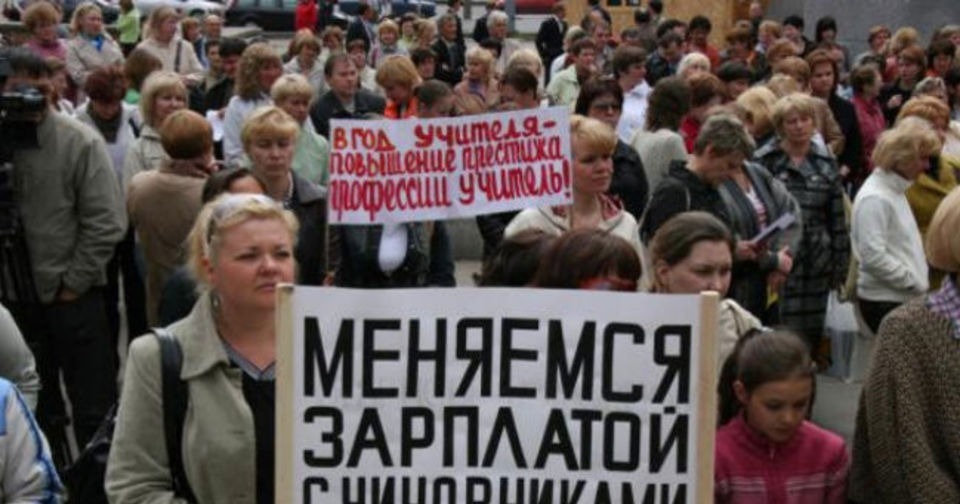The peninsula's occupation authorities have announced that they will raise their salaries but promise to “optimize the staff.” How much money do officials in the occupied territory receive, whom do the occupiers intend to lay off, and how do Crimeans view this decision?
The occupiers canceled the obligation to publish official information on the income of Crimean government officials three years ago - “for the duration of the special military operation”. Therefore, open sources only contain information about the officials' income in 2021. And even if we imagine that the salaries of collaborators have not been raised since then, the numbers are impressive.
For example, numerous assistants to Sergei Aksyonov received an average of 100,000 rubles per month (approximately $1,400 at the time). The head of the regular department in the apparatus of the self-proclaimed council of ministers had a salary of 150,000 (over $2,000). Ministers and heads of committees were paid 280,000 (about $3,800) each, and deputy prime ministers were paid up to 400,000 (over $5,400).

“In fact, salaries are reviewed at least once a year. This is nothing new. Another question is how much they are increased. For example, last year the salaries of educators were raised by as much as a thousand rubles (about 500 hryvnias), but I think that officials have a different order of figures,” says an employee of a state-funded children's institution in Bakhchisaray district.
At the same time, she explains that the collaborators are skillfully concealing information about such recalculations. The redistribution of budget funds to raise salaries for officials or pay bonuses is done with very vague wording. And it is simply impossible to understand from the outside that tens of millions were spent on indexing salaries for civil servants thanks to the latest budget amendments.
The occupiers call staff reductions the source of the current increase. “The bureaucratic apparatus is really huge. There are many unnecessary organizations and positions. There are many dual structures and all kinds of interagency formations that only compile reports and maintain pages on social networks. Dozens of positions that have no real functionality,” says an experienced civil servant, a former employee of the Belogorsk District Administration. However, he does not believe in the authenticity of the “optimization”.

In the occupied Crimea, there is no structure capable of giving an objective assessment of how the announced reduction of the bureaucracy is being carried out and whether it is taking place at all.
Independent media, as well as civic activists who used to perform such functions, were “purged” in the first year of the occupation of the peninsula. Until 2022, they tried to replace them with anti-corruption activists from Russian regions, but with the beginning of the full-scale invasion, they stopped all activity. One of them, on condition of anonymity, explained to us how the “optimization” would take place.
According to the former activist, the figures of the announced cuts look implausible. According to the main collaborator, Serhiy Aksyonov, it is planned to eliminate more than 500 positions in the republican authorities and more than 700 in city and district authorities. This is about 15% of the entire staff, or virtually every seventh employee.
“Promising is not a holding pattern. You can even promise to cut them in half. Then you can cheerfully report that all this has been done. Who will check? How will they check? There is no public data on this. No tools or indicators are presented. And if you start asking questions, taking an interest, they will say that you are a Ukrainian spy and are getting information for the enemies,” says the former anti-corruption activist. And he gives examples of absolutely barren staff positions in the government that will never be abolished “for ideological reasons”: departments for “coordinating anti-terrorist activities” or “developing public projects,” departments for “Cossacks” or “preventing corruption offenses.”

According to the former anti-corruption activist, the number of deputy prime ministers of the Crimean government deserves special attention. “There are currently ten of them. Half of them are curators from the Kremlin. The other half is the balance from Aksyonov. He has no right to lay off someone else's people, and he won't want to lay off his own, so as not to lose his influence. Each of them is paid for ten employees. But they will all stay, and if there is a reduction, some municipal officials from rural areas will be sent for layoffs,” my interlocutor explains.

Ordinary Crimeans do not accept the idea of “optimization” either. People do not believe in reducing the number of officials, and they consider raising their salaries outrageous. “Look around - where is the normal work of the authorities? They cannot provide garbage collection. They can't provide public transportation. One hundred meters of road have been under repair for a year. There are no doctors in the clinics, no discounted medicines in the pharmacies. Only retired seniors work in schools. There are constant interruptions with water and electricity. Should we raise their salaries for this?” one of the residents of Yevpatoria shares her painful experience.
Meanwhile, the occupation authorities have recently reprimanded almost all self-proclaimed heads of city administrations “for the lack of communication between services and residents.” It seems that the selection of victims of the demonstrative “large-scale optimization” has already begun.